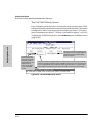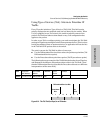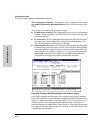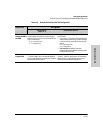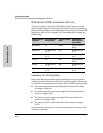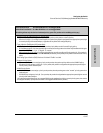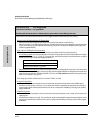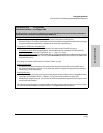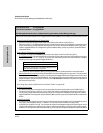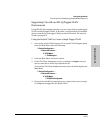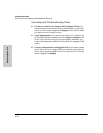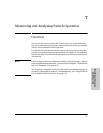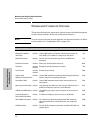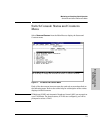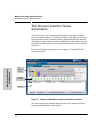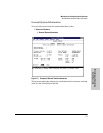
6-150
Configuring the Switch
Class of Service (CoS): Managing Bandwidth More Effectively
Configuring the Switch
Packet Enters Switch: In a tagged VLAN
Packet Exits From Switch: In a tagged VLAN
(Prioritizing affects both the choice of outbound priority queue and the packet’s 802.1p priority tag.)
In this scenario, the packet always carries a tagged VLAN field with an 802.1p priority setting, both inbound and outbound.
1. Device Priority (IP Address) Option
(IP Packets Only)
:
– If Device Priority does not apply to the packet, then packet priority defers to the ToS policy.
– If Device Priority (0 - 7) is configured and applies to a packet, then the packet is assigned to the appropriate queue
(high or normal priority) of the outbound port and the priority value is configured in the 802.1p priority tag in the
packet’s tagged VLAN field. This assignment replaces whatever 802.1p priority tag value the packet had when it
entered the switch.
2. Type of Service (ToS) Option
(IP Packets Only)
:
– If ToS option is configured to Disabled, then packet priority defers to the Protocol Priority policy.
– IP Precedence option: Prioritizes packet (high or normal) according to the value of the ToS precedence bits (upper
three bits of ToS field; 0 - 7); 4 - 7 = high, 0 - 3 = normal. Also, the Precedence bits are used as follows to configure
the 802.1p priority tag in the packet’s tagged VLAN field:
This assignment replaces whatever 802.1p priority tag value that the packet had when it entered the switch.
– Differentiated Services option: Prioritizes packet (high or normal) according to Priority you set (0 - 7) for the packet’s
ToS field Codepoint. Also, the 802.1p priority tag in the packet’s tagged VLAN field is configured to the same value
as the Priority you set for the ToS field Codepoint. This assignment replaces whatever 802.1p priority tag value the
packet had when it entered the switch. If Priority is set to No override (the default), then packet priority defers to
the Protocol Priority policy.
See “Using Type of Service (ToS) Criteria to Prioritize IP Traffic” on page 6-143.
3. Protocol Priority Option
:
– If Protocol Priority does not assign a priority to the packet, then packet priority defers to the VLAN ID policy.
– If Protocol Priority assigns a priority (0 - 7) to a packet, the packet is assigned to the appropriate queue (high or
normal priority) of the outbound port and the priority value is configured in the 802.1p priority tag in the packet’s
tagged VLAN field. This assignment replaces whatever 802.1p priority tag value the packet had when it entered the
switch.
4. VLAN Priority Option:
– If VLAN Priority does not assign a priority to the packet, then packet priority defers to the incoming 802.1p priority
value. (See “Incoming 802.1p Priority” in Table 6-7. Priority Criteria and Precedence on page 6-134.)
– If VLAN Priority assigns a priority (0 - 7) to a packet, the packet is assigned to the appropriate queue (high or normal
priority) of the outbound port and the priority value is configured in the 802.1p priority tag in the packet’s tagged
VLAN field. This assignment replaces whatever 802.1p priority tag value the packet had when it entered the switch.
0
1
1
2
2
0
3
3
4
4
5
5
6
6
*To interpret these settings, see Table 6-6. Mapping Priority
Settings to Device Queues on page 6-133.
7
7
IP Precedence Setting:
802.1p Priority Setting*:



